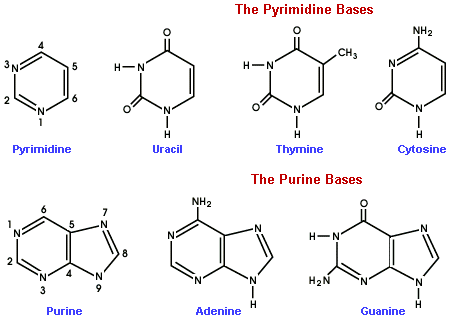What is Nucleotides?
Nucleotides are the basic building blocks of nucleic acids. Each nucleotide is composed of a nitrogen base, a 5-carbon sugar called a pentose, and an associated phosphate group.
The nitrogen bases are composed of either a single-ringed structure called a pyrimidine or a double-ringed purine. Uracil, thymine,and cytosine are pyrimidines, composed of a single ring of carbon and nitrogen atoms. Adenine and guanine are purines, compounds with a double ring of six carbon and five nitrogen atoms.

Each type of nucleic acid contains four nitrogen bases, two pyrimidines, and two purines. DNA molecules contain thymine, cytosine, adenine, and guanine. RNA molecules also contain cytosine, adenine, and guanine, but substitute uracil in place of thymine.
The sugar component of nucleotides also differs between the two types of nucleic acids. The sugar in DNA is deoxyribose, hence the full name, deoxyribonucleic acid, and the sugar in RNA is ribose, leading to the name ribonucleic acid.
Nucleotides (monomers) form polymers by joining the phosphate group of one nucleotide to the phosphate group of the next. This process creates a "backbone" of alternating sugar and phosphate groups. Nitrogen bases are attached to the 5-carbon sugar part of the nucleotide, extending along one side of the nucleic acid molecule.